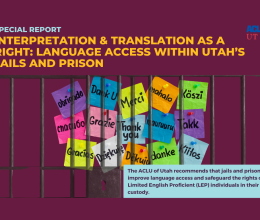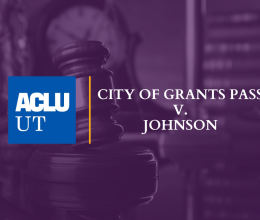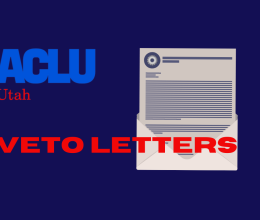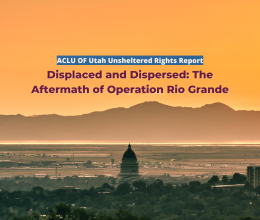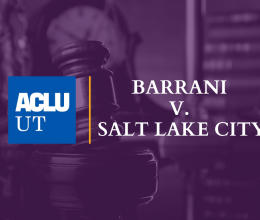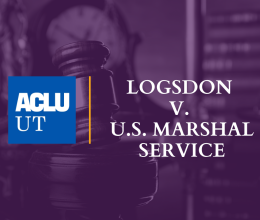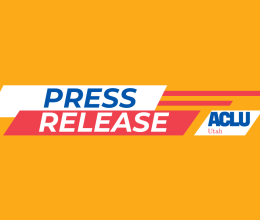
Two Years After Operation Rio Grande, Report Finds ORG Playbook Expanded Across Salt Lake County
SALT LAKE CITY – Today, a comprehensive new report, titled “Displaced and Dispersed: the aftermath of Operation Rio Grande”, is being released by the ACLU of Utah. The report focuses on the continuing impact law enforcement and policies influencing law enforcement actions have on our unsheltered communities.
It has been almost four years since the ACLU of Utah released our initial report on Operation Rio Grande (ORG), a large-scale law enforcement effort to address crime and unsheltered communities in Salt Lake City’s Rio Grande neighborhood. That report, titled Calculating the Real Cost of Operation Rio Grande, and our subsequent report, Endgame for Operation Rio Grande, both looked at the impact of the law enforcement-first approach to address issues facing unsheltered communities and the communities where they live.
Our latest report finds that certain policy decisions have maintained high law enforcement interactions with unsheltered communities since ORG, but what those interactions look like varies by the responding agency.
The report finds that:
- In Salt Lake County, conversations often center on the actual or perceived inequitable burden different neighbors have in providing services and resources for unsheltered communities.
- Collectively, Salt Lake County and the municipalities contained within do not have uniformly defined metrics for success in engagement with unsheltered communities or uniform records of the unsheltered population’s interactions with law enforcement.
- Over 85% of anti-camping citations from Salt Lake City Police Department officers in 2021 occurred after August 5th. The week before, Mayor Erin Mendenhall announced stricter, targeted camping enforcement, and the national eviction moratorium ended.
- In 2021, the Salt Lake City Police Department and South Salt Lake City Police department nearly returned to ORG citation levels. While Unified Police Department has not, they have expanded their citing range, frequently citing individuals residing on mountain pass roads.
- In Salt Lake County, it takes an average of over 3 months to resolve a camping citation in court when an unsheltered person appears for all court dates. A warrant is issued if a person fails to appear at court, which may result in being rearrested and booked into jail. It can be difficult for a community with inconsistent access to a cell phone, internet, or transportation to show up to court multiple times over 3 months.
- Individual case trajectories may vary by time or cost, but the final outcomes in the courts are usually similar. Generally, camping citations are often dismissed and do not result in convictions in Salt Lake County. Convictions often include fines and fees that place a substantial burden on indigent, unsheltered individuals with limited means and resources.
Deputy Legal Director Jason Groth stated, “We cannot arrest our way out of homelessness. Unsheltered communities are often further entrenched in day-to-day difficulties due to costly and needless citations or arrests.”
Groth further stated, “Anti-camping citations do not address underlying needs of unsheltered individuals and do not dissuade people from sleeping in public when they have no other choice. Punishing people for the unavoidable consequences of being unsheltered creates barriers rather than solutions and negatively impacts civil liberties.”
The ACLU of Utah encourages municipalities across Utah to develop policies and ordinances that respect the dignity and rights of unsheltered communities, rather than resorting to arrests, prosecutions, or fines for the unavoidable consequences of being unsheltered.
To view the report, click here.
###
Note to press: Individual copies of graphs or charts in the report can be made available. If you would like copies of a graph or chart to share with your coverage, please e-mail Aaron Welcher requesting which diagram(s) you would like a copy of for coverage.
When linking to the report in coverage please you the following link: www.acluutah.org/publications/displaced-and-dispersed-aftermath-operatio...

